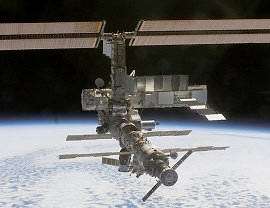Station Crew Will Try Orbit Boost Again

Russian experts will try again this Thursday to lift the International Space Station to a higher orbit to ease future rendezvous maneuvers and reduce the risk of collisions with orbiting debris.
The previous attempt to boost the orbit by 2,300 feet (700 meters) last Wednesday failed because of a technical problem with the station's thrusters.
Meanwhile, crew members Pavel Vinogradov and Jeff Williams have begun unloading some of the new supplies carried to the station last week aboard the Russian Progress 21 cargo spacecraft.
Progress brought fresh fruit and other foods, gifts from home, fuel, water, oxygen, spare parts and science gear. Two Progress craft are now docked with the station. The crew continues to use oxygen from the Progress 20, which arrived in December, to replenish cabin air when required. Vinogradov and Williams are loading that Progress with trash and unneeded equipment, and they will jettison it from the complex in mid-June.
Also last week, Williams successfully replaced a Remote Power Control Module in the station's Destiny laboratory. The module had not been functioning for some time, requiring mission controllers to reroute power supply for many lab systems. To gain access to the worksite for replacement of the component, Williams had to disassemble and remove his sleeping compartment.
Vinogradov completed routine maintenance of the station's Elektron system, which provides oxygen for the cabin air from water.
Copyright 2006 by Space Daily, Distributed United Press International





















